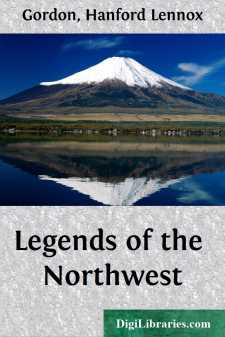Categories
- Antiques & Collectibles 13
- Architecture 36
- Art 48
- Bibles 22
- Biography & Autobiography 813
- Body, Mind & Spirit 142
- Business & Economics 28
- Children's Books 15
- Children's Fiction 12
- Computers 4
- Cooking 94
- Crafts & Hobbies 4
- Drama 346
- Education 46
- Family & Relationships 57
- Fiction 11829
- Games 19
- Gardening 17
- Health & Fitness 34
- History 1377
- House & Home 1
- Humor 147
- Juvenile Fiction 1873
- Juvenile Nonfiction 202
- Language Arts & Disciplines 88
- Law 16
- Literary Collections 686
- Literary Criticism 179
- Mathematics 13
- Medical 41
- Music 40
- Nature 179
- Non-Classifiable 1768
- Performing Arts 7
- Periodicals 1453
- Philosophy 64
- Photography 2
- Poetry 896
- Political Science 203
- Psychology 42
- Reference 154
- Religion 513
- Science 126
- Self-Help 84
- Social Science 81
- Sports & Recreation 34
- Study Aids 3
- Technology & Engineering 59
- Transportation 23
- Travel 463
- True Crime 29
Legends of the Northwest
Description:
Excerpt
PREFACE.
I have for several years devoted many of my leisure hours to the study of the language, history, traditions, customs and superstitions of the Dakotas. These Indians are now commonly called the "Sioux"—a name given them by the early French traders and voyageurs. "Dakota" signifies alliance or confederation. Many separate bands, all having a common origin and speaking a common tongue, were united under this name. See "Tah-Koo Wah-Kan," or "The Gospel Among the Dakotas," by Stephen R. Riggs, pp. 1 to 6 inc.
They were, but yesterday, the occupants and owners of the fair forests and fertile prairies of Minnesota—a brave, hospitable and generous people,—barbarians, indeed, but noble in their barbarism. They may be fitly called the Iroquois of the West. In form and features, in language and traditions, they are distinct from all other Indian tribes. When first visited by white men, and for many years afterwards, the Falls of St. Anthony (by them called the Ha-Ha) was the center of their country. They cultivated tobacco, and hunted the elk, the beaver and the bison. They were open-hearted, truthful and brave. In their wars with other tribes they seldom slew women or children, and rarely sacrificed the lives of their prisoners.
For many years their chiefs and head men successfully resisted the attempts to introduce spirituous liquors among them. More than a century ago an English trader was killed at Mendota, because he persisted, after repeated warnings by the chiefs, in dealing out mini-wakan (Devil-water) to the Dakota braves.
With open arms and generous hospitality they welcomed the first white men to their land; and were ever faithful in their friendship, till years of wrong and robbery, and want and insult, drove them to desperation and to war. They were barbarians, and their warfare was barbarous, but not more barbarous than the warfare of our Saxon and Celtic ancestors. They were ignorant and superstitious, but their condition closely resembled the condition of our British forefathers at the beginning of the Christian era. Macaulay says of Britain, "Her inhabitants, when first they became known to the Tyrian mariners, were little superior to the natives of the Sandwich Islands." And again, "While the German princes who reigned at Paris, Toledo, Arles and Ravenna listened with reverence to the instructions of Bishops, adored the relics of martyrs, and took part eagerly in disputes touching the Nicene theology, the rulers of Wessex and Mercia were still performing savage rites in the temples of Thor and Woden."
The day of the Dakotas is done. The degenerate remnants of that once powerful and warlike people still linger around the forts and agencies of the Northwest, or chase the caribou and the bison on the banks of the Sascatchewan, but the Dakotas of old are no more. The brilliant defeat of Custer, by Sitting Bull and his braves, was their last grand rally against the resistless march of the sons of the Saxons and the Celts. The plow-shares of a superior race are fast leveling the sacred mounds of their dead....



